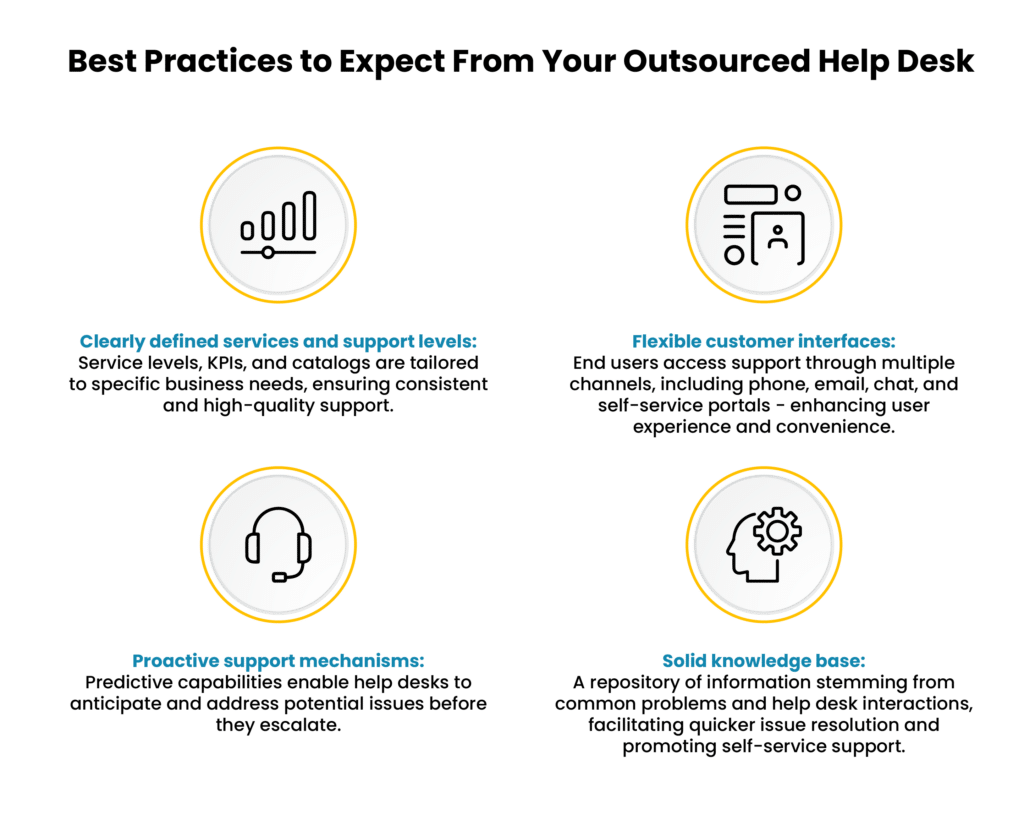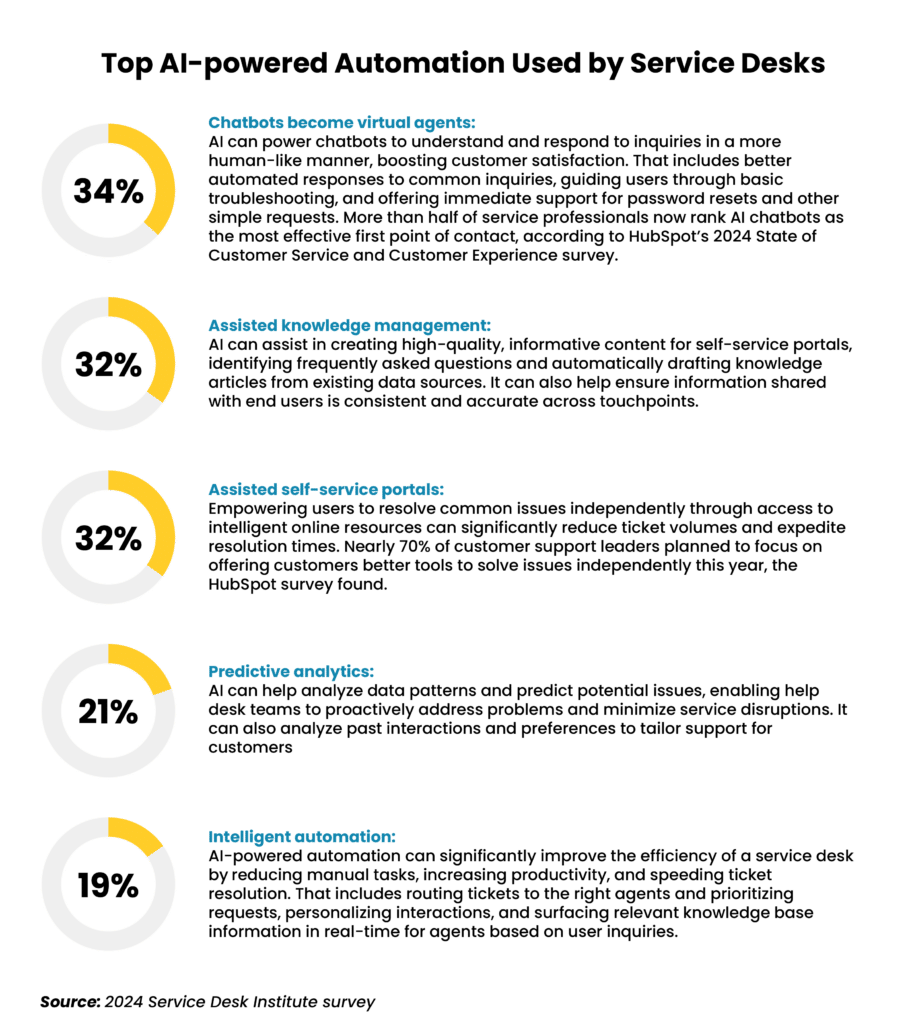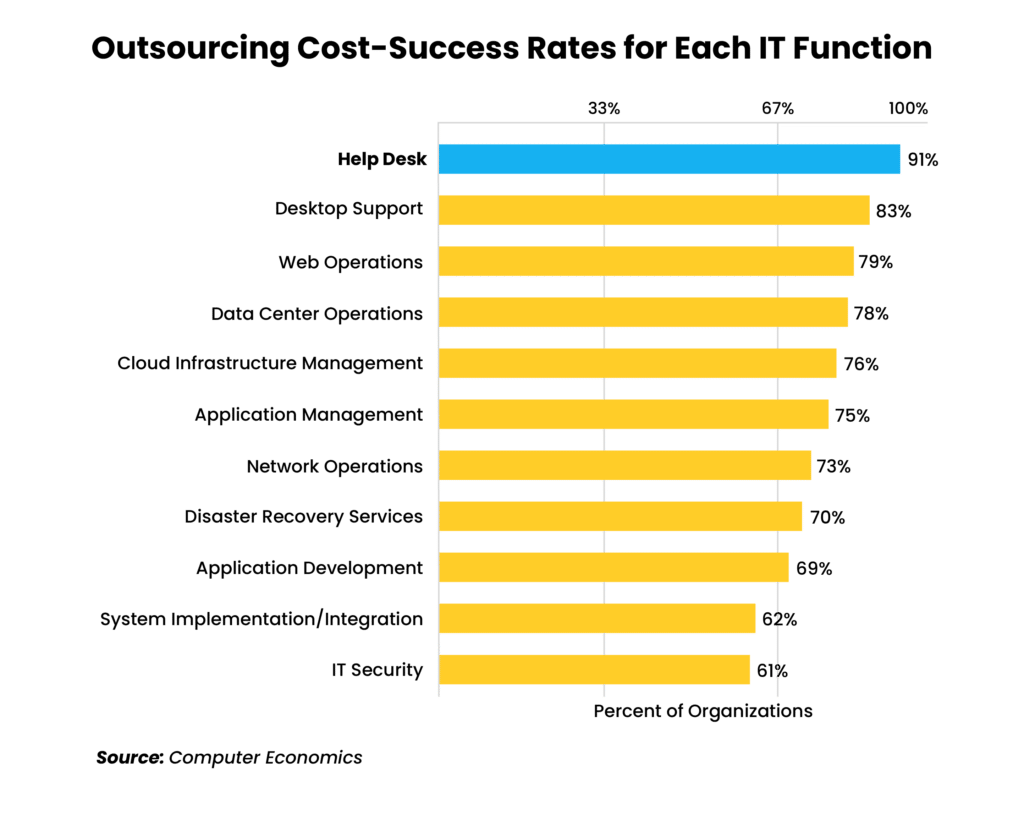In brief:
- Help desk ticket volumes are surging at the same time IT labor shortages stretch IT departments thin.
- Help desk is now one of the most outsourced IT functions, with outsourcing demand more than doubling since 2021.
- An outsourced service desk support team can deliver tangible benefits that boost performance, including cost savings, wider schedule coverage, faster response times, AI and automation tools, and increased customer satisfaction.
- Nearshore solutions offer key advantages that drive success, including top-tier talent, real-time communication, and less turnover.
A high-performing help desk stands as a strategic necessity in today’s business landscape – minimizing costly downtime while maximizing customer satisfaction. However, IT labor shortages are stretching in-house departments thin – at the same time hybrid work models, digitization, increased complexity in applications, and global business models requiring 24×7 support are causing ticket volumes to surge.
Demand for help desk outsourcing has more than doubled since 2021 to make it one of the most outsourced IT functions – with 50% of organizations now outsourcing help desk operations, according to the 2023 IT Outsourcing Statistics report by Computer Economics. And this trajectory is only expected to grow, with 92% of organizations expecting to increase or maintain the level of help desk work they outsource, the report found.
Reputable providers deliver instant access to the tools, resources, structured processes, and expertise needed to transform ineffective help desks. With the right outsourcing partner, organizations can expect High-Performance Service Desks that resolve 80% of user issues through proactive, optimized support.
Let’s examine eight tangible benefits your company can receive from an outsourced help desk.
1. Deliver quality outsourced IT help desk support to every end user
Confronted by ongoing IT labor shortages, many in-house help desks are stretched too thin to create a dedicated support structure. Poor and inconsistent service levels typically accompany the “break and fix” approach that results, with high costs, inadequate service schedules, an outdated knowledge base, and limited documentation or metrics.
Help desks are the core competency of IT support services providers. With deep experience defining, developing, and maintaining help desk processes for a variety of organizations, outsourcers resolve the issues that stop reactive internal teams from consistently delivering a high-quality outsourced IT service desk.

Detailed documentation and repeatable processes deliver consistent performance even if a valuable team member leaves or doesn’t show up for a few days. An efficient service desk is “process dependent,” not “people dependent.”
Of course, an outsourced service desk is also committed to hiring top-notch talent with the right skill sets, ensuring help desk teams are continuously updated with best practices, technical tools, service management processes, and training on new technologies.
With experience supporting a wealth of organizations, outsourced help desk agents are experts at troubleshooting and resolving technical problems. Gaining the ability to resolve a high percentage of help desk tickets at Level 1 significantly impacts user satisfaction – each ticket escalation leads to an average of 1 hour and 46 minutes of lost productivity (HappySignals Global IT Experience Benchmark Report 2023).
2. Leverage AI and automation to turbocharge service
Automation and AI are revolutionizing help desk operations – boosting efficiency, improving response times, and enabling proactive support. Interest in AI is high among service desk leaders: more than 70% of respondents to a 2024 Service Desk Institute survey said they are either researching AI possibilities or conducting pilot projects.
But 62% also said they find AI integration challenging.
Quality outsourcers can provide organizations with direct access to cutting-edge service desk tools and the right help desk software without implementation headaches or costs. Key help desk use cases include:

3. Boost response times and customer satisfaction
Poor help desk service sours the relationship between business and IT support teams. Yet without a formal service desk structure, response times from IT staff juggling multiple priorities can be frustratingly slow.
Help desk outsourcing can be a game-changer. Service-level agreements (SLAs) hold outsourcers accountable for response times and other performance metrics as they work to build relationships that drive referrals and long-term work.
A growing trend toward experience-level agreements (XLAs) takes outsourced service desks up another notch, providing a more holistic approach to performance management by measuring factors like user satisfaction and usability. By combining SLAs with XLAs, organizations can ensure timely response as well as a positive user experience from their help desk partner.
Help desk service providers also have the right tools and processes to improve outcomes. Reactive help desk teams may task any staff with any issue that comes in. As requests pile up, prioritization is often given to whoever complains loudest.
Quality outsourcers utilize a triage system with clear processes for prioritizing, routing, and escalating tickets – ensuring requests are quickly handled by the right team member with the right skillsets in the right order.
Exceptional providers also offer the option to implement an intelligent swarming approach to resolve complex or major incidents in real time. While traditional tiered IT support models involve well-defined escalation paths and issue hand-offs, intelligent swarming creates a collaborative effort between support agents and experts from different organizational teams.
The Technology & Services Industry Association (TSIA) found that providers using swarming models had Net Promoter Scores (NPS) that were 12.4 points higher than those with traditional help desk models, as well as 5.4% higher contract renewal rates.
4. Lower costs through labor arbitrage and efficiencies
Help desk outsourcing has a 91% success rate maintaining or lowering IT costs – the highest of any IT function, according to the Computer Economics report.

But here’s the thing: Computer Economics also found that help desk outsourcing offers one of the lowest success rates improving service experiences among IT functions – making the service desk provider you choose essential to success.
Not all outsourcing solutions are created equal. While locations like India and the Philippines offer the lowest costs, they often bring other challenges like out-of-sync time zones and cultural and language barriers.
Latin America has emerged as the go-to destination for U.S.-based operations over the past five to 10 years – combining significant cost savings with the real-time communication, outstanding English proficiency, and top-tier tech talent needed to solve urgent IT issues quickly. The number of foreign companies looking to hire tech resources in Latin America has increased by 156% – focused on leading nearshore markets like Colombia, Mexico, and Costa Rica.
Quality nearshore providers also reduce costs with the tools, best practices, and expertise to optimize help desk tasks and organizational structures – typically adding another 10-20% savings on top of labor arbitrage.
Today, IT organizations rank physical proximity as the biggest factor when considering outsourcing operations, while low cost is the lowest-ranked priority, the Computer Economics report found. With cost savings a given in any outsourcing transaction, organizations are more likely to choose a service provider within the same geographical region due to reduced operational challenges, the report found.

5. Mitigate turnover that impacts consistency and performance
North American help desks are confronting an alarming 42% attrition rate. As the IT labor shortage makes it easy to jump to new opportunities, Help Desk Tier 1 agent ranks among the hottest tech jobs this year, states Robert Half’s 2024 Technology Salaries & Hiring Trends Guide.
The situation is only marginally better in offshore locations like India, where an abundance of help desk jobs incentivizes experienced workers to continuously seek salary increases. Turnover is even worse on the overnight shifts that align with U.S. business hours, as India’s saturated job markets make it easy for top talent to choose regular work schedules.
More than 60% of Indian workers say they are likely to change employers within the next 12 months – higher than any other country, according to PwC’s India Workforce Hopes and Fears Survey 2023. Such frequent turnover not only increases costs, but impacts help desk expertise, as seasoned agents are constantly replaced with resources who need time to get up-to-speed.
Lower turnover is one of the main benefits of outsourcing help desk services to a top nearshore market in Latin America. Less saturated labor markets, in-sync work schedules, and cultural alignment that strengthens relationships with U.S. teams create a more stable workforce.
EY’s latest shared services center (SSC) survey on Colombia stated that 41% of the country’s SSCs experienced turnover below 5% – and 70% had turnover below 10%.
6. Infuse your help desk with flexibility
IT issues are unpredictable, especially during major transitions like system implementations when call volumes tend to surge. Help desk outsourcing allows for flexible scaling of resources to meet fluctuating demand.
Not only does this flexibility guarantee reliable support in any situation, but it ensures you never have to scramble to hire and train resources during an uptick. Consumption-based pricing models control costs, enabling you to only pay for processed tickets instead of carrying pricey support teams with inconsistent work.
Outsourcers are also better equipped to provide robust coverage hours like 24/7 support than in-house teams. This ensures end users in different time zones or working off-peak hours receive the same rapid response – and urgent requests never languish.
7. Gain valuable insights through reporting and visibility
Robust SLAs and XLAs keep organizations and outsourcers on the same page – establishing mutually agreed-upon terms, guidelines, and metrics that ensure expectations are met. Reporting critical metrics like First Contact Resolution Rate and Average Speed of Answer delivers important visibility into help desk performance – measuring success and ensuring gaps in service are quickly addressed.
A 2023 Forrester customer experience report states real-time reporting can boost first contact resolution by 15% and reduce resolution times by 10%. In contrast, internal help desks rarely have the tools or processes to ensure quality service, drive a continuous improvement mindset, or even measure service delivery costs.
Exceptional outsourcers also provide insight by monitoring predictive trends that can help lower ticket volumes and solve recurring issues. While traditional help desks simply react to requests, High-Performance Service Desks strive to proactively identify, resolve, and prevent problems before they lead to service-impacting incidents.
8. Focus internal IT teams on innovation and strategy
When technical issues arise, IT departments can be consumed by non-core business activities. As a result, the organization loses its strategic focus – risking revenue and productivity loss and, ultimately, unsatisfied customers.
Another benefit of help desk outsourcing services is that it allows IT resources to focus their talents on innovation and strategy. Instead of scrambling to stay on top of mundane technical issues, outsourcing gives internal teams the bandwidth to take advantage of emerging opportunities to drive business results.
Why Auxis: Boost user productivity and satisfaction with your outsourced help desk
With technology integral to business success, a well-run service desk is no longer a “nice to have” – it’s a necessity.
The Computer Economics report reveals confidence in help desk outsourcing solutions: Organizations that choose to outsource their service desk are asking third-party providers to perform an average 55% of their operations – the largest percentage among IT functions.
Partnering with an exceptional help desk nearshoring provider like Auxis is key to achieving promised benefits – delivering proactive service desks that increase end-user satisfaction and productivity, optimize operating costs, and free internal teams to innovate faster.
Want to learn more about how help desk services and nearshore outsourcing can support your business needs? Schedule a consultation with our help desk leaders today! Or visit our resource center to learn more help desk trends, strategies, and success stories.




